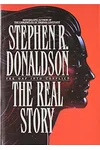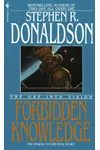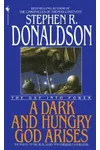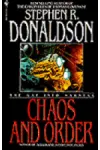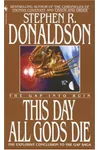Step into the gritty, star-spanning universe of the Gap Cycle, where survival demands cunning, courage, and a touch of moral ambiguity! Penned by Stephen R. Donaldson, this science fiction epic trades polished heroes for flawed, unforgettable characters navigating a cosmos rife with betrayal, power struggles, and alien threats. If you crave a space opera that’s as psychologically intense as it is thrilling, the Gap Cycle is your next obsession.
Unlike traditional sci-fi with clear-cut good guys, this series dives deep into the murky waters of human nature, inspired by Wagner’s operatic Ring Cycle. Ready to explore a future where faster-than-light ‘gap’ drives fuel commerce and chaos? Let’s blast off!
How the Gap Cycle Began
Stephen R. Donaldson, famed for his dark fantasy series The Chronicles of Thomas Covenant, ventured into sci-fi with the Gap Cycle in the early 1990s. What started as a novella experiment—exploring the shifting roles of villain, victim, and rescuer—morphed into a five-book saga when Donaldson reimagined it as a loose retelling of Wagner’s Ring Cycle. Published between 1991 and 1996 by Bantam Books, the series captivated readers with its raw intensity and complex narrative, later earning a UK reprint by Gollancz in 2008 that combined the first two books at Donaldson’s request.
The Heart of the Gap Cycle
The Gap Cycle unfolds across five novels, each building a sprawling tale of survival and political intrigue. The Gap Into Conflict: The Real Story introduces Angus Thermopyle, a ruthless pirate, Morn Hyland, a United Mining Companies Police ensign, and Nick Succorso, a charismatic rival. This dark, compact opener sets a brutal tone with themes of abuse and power. The Gap Into Vision: Forbidden Knowledge expands the scope, following Morn’s fight for autonomy amidst alien Amnion threats. The Gap Into Power: A Dark and Hungry God Arises and The Gap Into Madness: Chaos and Order weave in corporate conspiracies, while This Day All Gods Die delivers a climactic showdown.
The series’ strength lies in its unflinching exploration of ethics, redemption, and psychological trauma, set against a vividly realized universe of space stations, faster-than-light travel, and alien machinations. Donaldson’s prose is dense yet gripping, subverting space opera tropes with morally gray characters and intricate plotting. The Amnion, a chilling alien race with mutagenic motives, add a layer of existential dread, while ‘Ancillary Documentation’ chapters ground the world in detailed science and politics.
Why the Gap Cycle Resonates
The Gap Cycle isn’t for the faint of heart—its raw depiction of violence and trauma has sparked debate, yet it’s this boldness that cements its cult status among sci-fi fans. Donaldson’s ability to humanize monstrous characters, like the initially despicable Angus, keeps readers hooked, transforming revulsion into reluctant admiration. The series’ influence lies in its challenge to genre norms, blending space opera’s grandeur with psychological depth akin to literary fiction.
Decades later, the Gap Cycle remains a touchstone for readers seeking cerebral, character-driven sci-fi. Its exploration of power dynamics and resilience resonates in today’s complex world, earning praise for its ambitious storytelling and unforgettable cast.
- Publication Years: 1991–1996
- Number of Books: 5
- Setting: A commerce-driven future with faster-than-light ‘gap’ drives
- Notable Themes: Ethics, redemption, power, psychological trauma
Grab The Gap Into Conflict: The Real Story and dive into the Gap Cycle’s thrilling, thought-provoking universe! Whether you’re a sci-fi veteran or a curious newcomer, this series promises a wild ride through the stars.
